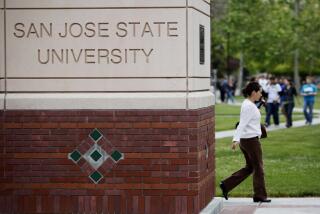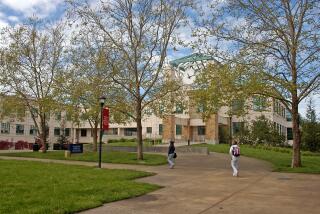Academic freedom at risk? Prof who backed Hong Kong protests denied post
- Share via
Reporting from Hong Kong — In a move widely seen as kowtowing to Beijing, the oldest and most prestigious university in Hong Kong on Tuesday denied a promotion to a well-respected law professor and vocal supporter of the territory’s pro-democracy movement.
The eight-month drama over the appointment has drawn attention from academic circles in both the United States and Britain, fueling concern that Communist Party leaders in Beijing are eroding academic freedom in Hong Kong. China’s education minister recently issued directives warning campuses against the teaching of “Western values,” without specifying whether the order was limited to the mainland or extended to the semi-autonomous territory.
The University of Hong Kong’s governing council voted 12 to 8 on Tuesday evening to reject the proposed appointment of former law dean Johannes Chan to the position of pro-vice chancellor. The decision came after an eight-month delay, making it one of the most politically incendiary issues of 2015 in the territory of 7.4 million.
Citing confidentiality, the council declined to describe the deliberation or offer any justification for the vote. According to student union President Billy Fung, who is on the panel, some members complained that Chan, whose promotion had been recommended by a faculty selection committee, lacks a PhD pedigree and made dean merely as a “nice guy.”
HKU’s vice chancellor, Peter Mathieson, said he respected the council’s decision.
Roughly 10% of undergraduates at Hong Kong colleges and more than 60% of graduate students hail from mainland China.
“This will send a horrible signal, which is: As an academic, you should shut up. Should he have compromised his values in order to gain a position?” said William Tierney, a USC professor who specializes in academic freedom. As a visiting fellow at HKU’s College of Education for the last two years, Tierney said he has been following the saga closely.
Chan was pilloried in a Chinese Communist Party-controlled newspaper late last year during the waning weeks of the Umbrella Movement, a sit-in campaign for free and fair elections in the territory. Among the key initiators of the civil disobedience movement was Hong Kong University law professor Benny Tai, and the campaign began while Chan was dean.
Hong Kong, a former British colony, returned to Chinese sovereignty in 1997. Since then, its affairs have been conducted under a framework known as “one country, two systems.” The mini-constitution, known as the Basic Law, guarantees that educational institutions “retain their autonomy and enjoy academic freedom.”
Many of Hong Kong’s political and intellectual leaders are Hong Kong University alumni. The institution dominated the higher-education landscape well into the 1970s, serving as the finishing school to groom city elite and civil servants.
By the 1990s, as college access was broadened to the middle and working classes, several more universities opened their doors. Staffed mostly with Western-educated locals, these colleges, along with HKU, have evolved from a rarefied reserve into a socially active academe.
The decision not to elevate Chan may further fan resentment against Leung Chun-ying, the territory’s much-maligned, Beijing-backed leader. As chancellor of all universities here by default, Leung appointed several Beijing loyalists to the governing council, who voted against Chan’s appointment.
Chan’s appointment had received backing from some student and alumni groups, but several pro-Beijing groups calling themselves Voice of Loving Hong Kong and the Defend Hong Kong Campaign had lobbied against him.
In an op-ed in a local Chinese-language daily newspaper, New York University legal scholar and Sinologist Jerry Cohen voiced support for Chan for his work in promoting academic interaction among Chinese lawyers and scholars.
Cohen also noted that five Chinese human rights lawyers were recently barred from traveling to Hong Kong due to “national security” concerns – a sign, he said, that Hong Kong is no longer a safe harbor for unfettered academic exchange.
Dixon Ming Sing, a professor of social sciences at the University of Science and Technology, who like Chan has been the target of attacks in the Communist Party-backed media, said even though he suffered no career setback as Chan did, he was still stung by the experience.
“The major message I got was that Beijing was trying to tighten its screw on Hong Kong in a way I didn’t foresee before,” said Sing. “It tries to curb not just academic freedom but also the freedom of speech.”
Law is a special correspondent.
More to Read
Sign up for Essential California
The most important California stories and recommendations in your inbox every morning.
You may occasionally receive promotional content from the Los Angeles Times.









